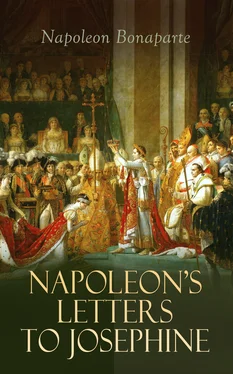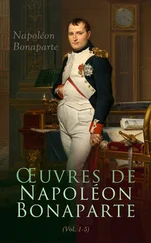Müller, the celebrated Swiss historian, who had a private interview with Napoleon at this period, has left a still fuller account of the impression he received. "The Emperor12 began to speak," says Müller, "of the history of Switzerland, told me that I ought to complete it, that even the more recent times had their interest. He proceeded from the Swiss to the old Greek constitutions and history; to the theory of constitutions; to the complete diversity of those of Asia, and the causes of this diversity in the climate, polygamy, &c.; the opposite characters of the Arabian and the Tartar races; the peculiar value of European culture, and the progress of freedom since the sixteenth century; how everything was linked together, and in the inscrutable guidance of an invisible hand; how he himself had become great through his enemies; the great confederation of nations, the idea of which Henry IV. had; the foundation of all religion, and its necessity; that man could not bear clear truth, and required to be kept in order; admitting the possibility, however, of a more happy condition if the numerous feuds ceased, which were occasioned by too complicated constitutions (such as the German), and the intolerable burden suffered by states from excessive armies." These opinions clearly mark the guiding motives of Napoleon's attempts to enforce upon different nations uniformity of institutions and customs. "I opposed him occasionally," says Müller, "and he entered into discussion. Quite impartially and truly, as before God, I must say that the variety of his knowledge, the acuteness of his observations, the solidity of his understanding (not dazzling wit), his grand and comprehensive views, filled me with astonishment, and his manner of speaking to me, with love for him. By his genius and his disinterested goodness, he has also conquered me." Slowly but surely they are conquering the world. Of his goodness we have the well-weighed verdict of Lord Acton, that it was "the most splendid that has appeared on earth." Of his goodness, we may at least concur in the opinion of the old British tar at Elba, quoted by Sir Walter, and evidently his own view, that "Boney was a d—d good fellow after all."
With regard to the character of Josephine opinions still differ about every quality but one. Like the friend of Goldsmith's mad dog—
"A kind and gentle heart she had
To comfort friends and foes:"
either her brother Mason Cambacérès, or her brother Catholic and unbrotherly brother-in-law Lucien.
From early days she had learnt "how to flirt and how to fib." Morality was at a low ebb during the French Revolution, when women often saved their necks at the expense of their bodies, and there is unfortunately no doubt that Josephine was no exception. It is certain, however, from his first letters to Josephine, that Napoleon knew nothing of this at the time of his honeymoon (solus) in Italy. Gradually, but very unwillingly, his eyes were opened, and by the time he had reached Egypt he felt himself absolved from the absolute faithfulness he had hitherto preserved towards his wife. On his return Josephine becomes once more his consort, and even his friend—never again his only love. Josephine's main characteristic henceforward is to make everybody happy and comfortable—in spite of Napoleon's grumblings at her reckless prodigality; never to say No! (except to her husband's accusations) suits her Creole disposition best, especially as it costs her no active exertion, and the Emperor pays for all. And so, having been in turn Our Lady of Victories and Saint Mary the Egyptian, she becomes from her coronation to her death-day "The Mother of the Poor."
The Sources of the Letters.—These may be divided into three parts—(1st) the Early Love-Letters of 1796; (2nd) the Collection published by Didot Frères in 1833; and (3rd) the few scattered Letters gathered from various outside sources.
(1st) With regard to the Early Love-Letters of 1796, these are found most complete in a work published by Longmans in 1824, in two volumes, with the title, "A Tour through Parts of the Netherlands, Holland, Germany, Switzerland, Savoy, and France, in the year 1821-2, by Charles Tennant, Esq.; also containing in an Appendix Fac-simile Copies of Eight Letters in the handwriting of Napoleon Bonaparte to his wife Josephine."
The author introduces them with an interesting preface, which shows that then, as now, the interest in everything connected with Napoleon was unabated:—
"Long after this fleeting book shall have passed away, and with its author shall have been forgotten, these documents will remain; for here, perhaps, is to be found the purest source of information which exists, touching the private character of Napoleon Bonaparte, known, probably, but to the few whose situations have enabled them to observe that extraordinary man in the undisguised relations of domestic life. Although much already has been said and written of him, yet the eagerness with which every little anecdote and incident of his life is sought for shows the interest which still attaches to his name, and these, no doubt, will be bequests which posterity will duly estimate. From these it will be the province of future historians to cull and select simple and authenticated facts, and from these only can be drawn a true picture of the man whose fame has already extended into every distant region of the habitable globe.
"I will now proceed to relate the means by which I am enabled to introduce into this journal fac-simile copies of eight letters in the handwriting of Napoleon Bonaparte, the originals of which are in my possession. Had these been of a political nature, much as I should prize any relics of such a man, yet they would not have appeared in a book from which I have studiously excluded all controversial topics, and more especially those of a political character. Neither should I have ventured upon their publication if there were a possibility that by so doing I might wound the feelings of any human being. Death has closed the cares of the individuals connected with these letters. Like the memorials of Alexander the Great or of Charlemagne, they are the property of the possessor, and through him of the public; but not like ancient documents, dependent upon legendary evidence for their identity and truth.
"These have passed to me through two hands only, since they came into possession of the Empress Josephine, to whom they are written by their illustrious author. One of the individuals here alluded to, and from whom I received these letters, is a Polish nobleman, who attached himself and his fortunes to Bonaparte, whose confidence he enjoyed in several important diplomatic negotiations."
This book and these letters were known to Sir Walter Scott, who made use of some of them in his History of Napoleon . M. Aubenas, in his Histoire de l'Impératrice Joséphine , published in 1857, which has been lavishly made use of in a recent work on the same subject, seems to have known, at any rate, four of these letters, which were communicated to him by M. le Baron Feuillet de Conches. Monsieur Aubenas seems never to have seen the Tennant Collection, of which these undoubtedly form part, but as Baron Feuillet de Conches was an expert in deciphering Bonaparte's extraordinary caligraphy, these letters are very useful for reference in helping us to translate some phrases which had been given up as illegible by Mr. Tennant and Sir Walter Scott.
(2nd) The Collection Didot . This enormously valuable collection forms by far the greater part of the Letters that we possess of Napoleon to his wife. They are undoubtedly authentic, and have been utilised largely by Aubenas, St. Amand, Masson, and the Correspondance de Napoléon I. They were edited by Madame Salvage de Faverolles. As is well known, Sir Walter Scott was very anxious to obtain possession of these letters for his Life of Napoleon , and his visit to Paris was partly on this account. In Archibald Constable and his Literary Correspondents , edited in 1873 by his son, we find the following:—
Читать дальше












